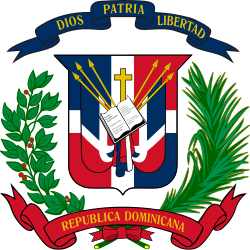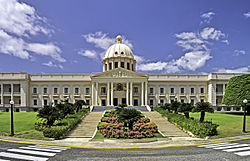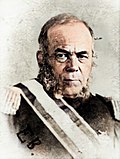| Portrait | Name
(Birth–Death) | Elected | Term of office | Political
party | Notes |
|---|
| Took office | Left office | Time in office |
|---|
|  | Pedro Antonio Pimentel
(1830–1874) | — | 11 July 1865 | 4 August 1865 | 24 days | — | Ousted from office by a coup d'état. |
|---|
|  | José María Cabral
(1816–1899) | — | 4 August 1865 | 15 November 1865 | 103 days | Blue | Cabral was proclaimed "Protector of the Republic" until the election of a new president by the National Convention. |
|---|
|  | Pedro Guillermo
(1814–1867) | — | 15 November 1865 | 8 December 1865 | 23 days | — | Guillermo was appointed as Interim President until the arrival to the Dominican Republic of Buenaventura Báez, who was exiled in Curaçao. |
|---|
|  | Buenaventura Báez
(1812–1884) | 1865 | 8 December 1865 | 29 May 1866 | 172 days | Red | Ousted from office by a coup d'état. |
|---|
|    | Triumvirate | — | 29 May 1866 | 22 August 1866 | 85 days | — | Members: Pedro Antonio Pimentel, Gregorio Luperón, Federico de Jesús García.
The Electoral College system was abolished and replaced by universal direct suffrage. |
|---|
| 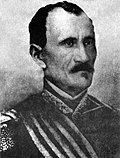 | José María Cabral
(1816–1899) | — | 22 August 1866 | 29 September 1866 | 1 year, 162 days | Blue | Interim president. |
|---|
| 1866 | 29 September 1866 | 31 January 1868 | Cabral was the first Dominican president elected by universal direct suffrage. Ousted from office by a coup d'état. |
|  | Manuel Altagracia Cáceres
(1838–1878) | — | 31 January 1868 | 13 February 1868 | 13 days | — | |
|---|
| 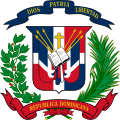 | Junta of Generals | — | 13 February 1868 | 2 May 1868 | 79 days | — | Members: José Antonio Hungría, Francisco Antonio Gómez Báez, José Ramón Luciano y Franco. |
|---|
|  | Buenaventura Báez
(1812–1884) | 1868 | 2 May 1868 | 2 January 1874 | 5 years, 245 days | Red | Ousted from office by defeat in the Six Years' War. |
|---|
|  | Ignacio María González
(1838–1915) | — | 25 November 1873 | 21 January 1874 | 57 days | Green | Supreme chief. |
|---|
| 
 | Ignacio María González
(1838–1915)
Manuel Altagracia Cáceres
(1838–1878) | — | 21 January 1874 | 5 February 1874 | 15 days | — | Generals in charge of the Supreme Power of the Nation. |
|---|
|  | Ignacio María González
(1838–1915) | 1874 | 5 February 1874 | 23 February 1876 | 2 years, 18 days | Green | Resigned. |
|---|
|  | Council of Secretaries of State | — | 23 February 1876 | 29 April 1876 | 66 days | — | Members: Pedro Tomás Garrido Matos, José de Jesús Eduardo de Castro Álvarez, Pedro Pablo de Bonilla y Correa-Cruzado, Juan Bautista Zafra y Miranda, Pablo López Villanueva (until 7 March 1876), Jacinto Peynado y Tejón (since 7 March 1876). |
|---|
|  | Ulises Francisco Espaillat
(1823–1878) | 1876 | 29 April 1876 | 5 October 1876 | 159 days | Blue | Ousted from office by a coup d'état. |
|---|
|  | Superior Governing Junta | — | 5 October 1876 | 11 November 1876 | 37 days | — | Members: Pedro Tomás Garrido Matos, José de Jesús Eduardo de Castro Álvarez, Juan Bautista Zafra y Miranda, Pablo López Villanueva, José Caminero Matías, Fidel Rodríguez Urdaneta, Juan Esteban Ariza Matos. |
|---|
|  | Ignacio María González
(1838–1915) | — | 11 November 1876 | 9 December 1876 | 28 days | Green | Resigned. |
|---|
| 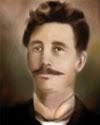 | Marcos Antonio Cabral
(1842–1903) | — | 10 December 1876 | 26 December 1876 | 16 days | — | President of the Provisional Government Junta. |
|---|
|  | Buenaventura Báez
(1812–1884) | — | 27 December 1876 | 2 March 1878 | 1 year, 65 days | Red | Ousted from office by a coup d'état. |
|---|
|  | Ignacio María González
(1838–1915) | — | 1 March 1878 | 3 May 1878 | 63 days | Green | President of the Provisional Government of the National Movement. |
|---|
|  | Council of Secretaries of State | — | 2 March 1878 | 5 March 1878 | 3 days | — | Members: José María Cabral, Joaquín Montolío. |
|---|
|  | Cesáreo Guillermo
(1847–1885) | — | 5 March 1878 | 6 July 1878 | 123 days | Red | Interim president. |
|---|
|  | Ignacio María González
(1838–1915) | 1878 | 6 July 1878 | 2 September 1878 | 58 days | Green | Ousted from office by a coup d'état. |
|---|
|   | Superior Leaders of the Revolutionary Movement | — | 2 September 1878 | 6 September 1878 | 4 days | — | Members: Ulises Heureaux, Cesáreo Guillermo. |
|---|
| 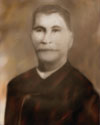 | Jacinto de Castro
(1811–1896) | — | 7 September 1878 | 29 September 1878 | 22 days | — | President of the Supreme Court of Justice. Resigned. |
|---|
|  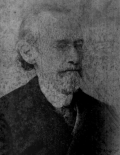  | Council of Secretaries of State | — | 30 September 1878 | 27 February 1879 | 150 days | — | Members: Cesáreo Guillermo, Alejandro Angulo Guridi, Pedro María Aristy. |
|---|
|  | Cesáreo Guillermo
(1847–1885) | 1879 | 27 February 1879 | 6 December 1879 | 282 days | Red | Ousted from office by a coup d'état. |
|---|
|  | Gregorio Luperón
(1839–1897) | — | 6 October 1879 | 1 September 1880 | 331 days | Blue | |
|---|
|  | Fernando Arturo de Meriño
(1833–1906) | 1880 | 1 September 1880 | 1 September 1882 | 2 years | Blue | |
|---|
|  | Ulises Heureaux
(1845–1899) | 1882 | 1 September 1882 | 1 September 1884 | 2 years | Blue | |
|---|
|  | Francisco Gregorio Billini
(1844–1898) | 1884 | 1 September 1884 | 16 May 1885 | 257 days | Blue | Resigned. |
|---|
|  | Alejandro Woss y Gil
(1856–1932) | — | 16 May 1885 | 6 January 1887 | 1 year, 235 days | Blue | Vice-president under Francisco Gregorio Billini, assumed the presidency after his resignation. |
|---|
|  | Ulises Heureaux
(1845–1899) | 1886 | 6 January 1887 | 27 February 1889 | 12 years, 201 days | Blue | |
|---|
| 1888 | 27 February 1889 | 27 February 1893 |
| 1892 | 27 February 1893 | 27 February 1897 |
| 1896 | 27 February 1897 | 26 July 1899 | Assassinated. |
|  | Wenceslao Figuereo
(1834–1910) | — | 26 July 1899 | 30 August 1899 | 35 days | Blue | Vice-president under Ulises Heureaux, assumed the presidency after his assassination. Ousted from office by a coup d'état. |
|---|
|  | Council of Secretaries of State | — | 31 August 1899 | 0 days | — | Members: Tomás Demetrio Morales, Arístides Patiño, Enrique Henríquez y Alfau, Jaime R. Vidal, Braulio Álvarez. |
|---|
|  | People's Revolutionary Governing Junta | — | 31 August 1899 | 4 September 1899 | 4 days | — | Members: Mariano Cestero, Álvaro Logroño, Arístides Patiño, Pedro María Mejía. |
|---|
|  | Horacio Vásquez
(1860–1936) | — | 4 September 1899 | 15 November 1899 | 72 days | Red | Interim president. |
|---|
| 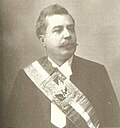 | Juan Isidro Jimenes Pereyra
(1846–1919) | 1899 | 15 November 1899 | 2 May 1902 | 2 years, 168 days | Blue | Ousted from office by a coup d'état. |
|---|
|  | Horacio Vásquez
(1860–1936) | — | 26 April 1902 | 23 April 1903 | 362 days | Red | Ousted from office by a coup d'état. |
|---|
|  | Alejandro Woss y Gil
(1856–1932) | — | 23 March 1903 | 1 August 1903 | 246 days | Blue | Interim president. |
|---|
| 1903 | 1 August 1903 | 24 November 1903 | Ousted from office by a coup d'état. |
|  | Carlos Felipe Morales
(1868–1914) | — | 24 November 1903 | 17 June 1904 | 2 years, 30 days | Red | Interim president. |
|---|
| 1904 | 17 June 1904 | 24 December 1905 | Resigned. |
|  | Council of Secretaries of State | — | 24 December 1905 | 29 December 1905 | 5 days | — | Members: Manuel Lamarche García, Emiliano Tejera, Andrés Julio Montolío, Francisco Leonte Vásquez Lajara, Carlos Ginebra, Eladio Victoria, Federico Velásquez y Hernández. |
|---|
|  | Ramón Cáceres
(1866–1911) | — | 29 December 1905 | 1 July 1908 | 5 years, 325 days | Red | Vice-president under Carlos Felipe Morales, assumed the presidency after his resignation. |
|---|
| 1908 | 1 July 1908 | 19 November 1911 | Assassinated at the start of the 1911–1912 Civil War. |
|  | Council of Secretaries of State | — | 19 November 1911 | 5 December 1911 | 16 days | — | Members: Miguel Antonio Román, José María Cabral. |
|---|
|  | Eladio Victoria
(1864–1939) | — | 5 December 1911 | 27 February 1912 | 361 days | — | Interim president appointed by the Congress. |
|---|
| 1912 | 27 February 1912 | 30 November 1912 | Resigned at the end of the 1911–1912 Civil War. |
|  | Adolfo Alejandro Nouel
(1862–1937) | — | 1 December 1912 | 13 April 1913 | 133 days | — | Archbishop of Santo Domingo, interim president appointed by the Congress. Resigned. |
|---|
|  | José Bordas Valdez
(1874–1968) | — | 14 April 1913 | 15 June 1914 | 1 year, 134 days | — | Interim president appointed by the Congress. |
|---|
June
1914 | 15 June 1914 | 27 August 1914 | Resigned at the end of the 1914 Civil War. |
|  | Ramón Báez
(1858–1929) | — | 28 August 1914 | 5 December 1914 | 99 days | — | Interim president. |
|---|
|  | Juan Isidro Jimenes Pereyra
(1846–1919) | Oct.
1914 | 6 December 1914 | 4 May 1916 | 1 year, 150 days | Blue | |
|---|
